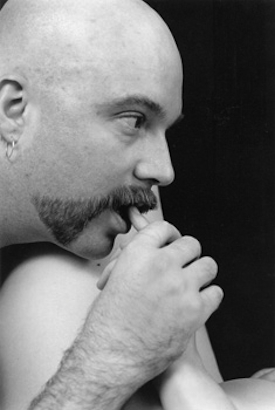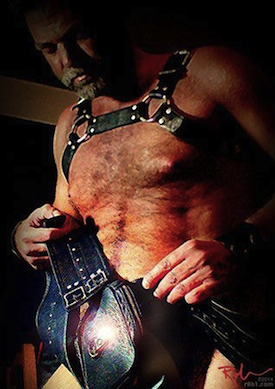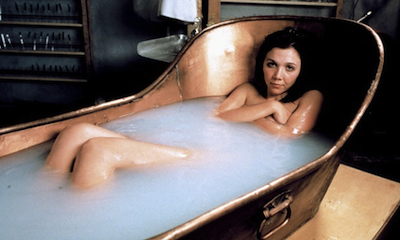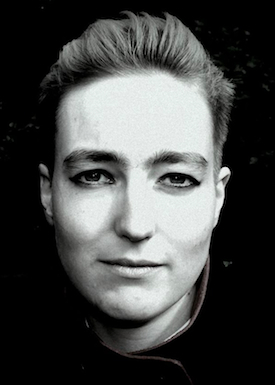Note: This week’s sex-and-relationships column comes from the Sexuality.org archives. David Steinberg, a former Planet Waves contributor, wrote it in 1998. In light of Mars and Eros conjoining Nessus in Aquarius this weekend, I’m very curious to hear how readers feel the experience of feminist men has evolved in the 16 years since. — Amanda
By David Steinberg.
Ironically enough, one of the clearest expressions I have heard of the sexual dilemma facing men who define themselves as feminist came from an outspokenly feminist woman. She was speaking about her own difficulty in integrating her feminist beliefs with her sexual desires.

Photo by David Steinberg.
“I don’t know what I’m supposed to do,” she said early in the 1980’s, about having intercourse with her male partner. “If he’s on top, he’s dominating me. If I’m on top, I’m servicing him. My feminism and my sexuality are both essential to me. I’m not willing to choose one over the other. I don’t know what to do.”
Subjecting one’s sexual desire to the rigors of ideological political analysis is both important and a tricky piece of work. It’s important because how we think of sex, and how we think of ourselves as sexual people, has real political meaning, especially with regard to how power is distributed among men and women. But it is also tricky because we have such strongly ingrained tendencies to interpret sex negatively, and because once the watchful eyes of the internalized sex police are mounted on your shoulder, passion and spontaneity have a way of going out the window. And, let’s face it, sex, no matter how correctly micromanaged, is nowhere without passion and spontaneity.
I have a lot of sympathy for the sexual dilemmas of men who pay serious attention to feminist issues. I have strongly identified with the feminist movement since the late 1960’s, not only in terms of that movement’s analysis of the unjust power imbalances between men and women in society, but also for its radical redefinition of male and female gender roles.
At the personal level, I have been inspired by feminism not out of guilt over my previously unenlightened consciousness, but because feminism offered me both the opportunity and the insight to become the kind of man that I had always wanted to be but that traditional American culture regards, essentially, as unmanly. Being rough, tough, stoic, able to leap tall buildings at a single bound, fight the good wars, be the main provider of family income, always know how to protect the poor little woman from the nastiness of the world, and die at an early age — well, it wasn’t really my thing.
So I was delighted when a movement came along that called upon both women and men to see through the gender roles handed them by society, and begin to put things together differently. Rather than seeing the empowerment of women as a threat, I saw it as a relief, even if it meant giving up all sorts of male privilege. Even now, when the term feminist is more associated with man-hating than with the struggle for the equal rights of women, I hold on to the notion of myself as a feminist man quite fondly. I would rather work to preserve the original meaning of the word than turn it over to the media wolves to malign. Call me sentimental….
When my wife joined a women’s consciousness-raising group and the light bulbs of seeing things in new ways began going on in her head week after week, I experienced a kind of secondary redefinition of myself by osmosis. Every time she saw through some traditional definition of what it meant to be a woman, I got to see through something about traditional definitions of being a man. It was exciting. I read feminist books one after another. The liberation of women from traditional roles was aligned with, not against, my own liberation
Eventually it dawned on me that, instead of simply envying my wife the support she got from meeting with and talking to other women about mutual concerns, I could myself get together with men who were in many ways like me, and enjoy many of the same benefits. I tried to organize a men’s group for the first time in 1970. After a couple of false starts, I found my way to a group of men who were actually able to talk honestly to each other about big, unresolved issues in our lives: the masculinity bugaboo, career, fathering, relationships with women, a wide range of unacknowledged fears and insecurities, loneliness, loss, competition and fear of being vulnerable with other men, sexual orientation, sex.
Sex for real: what we liked and didn’t like, what we understood and didn’t understand, how we felt good and not so good about ourselves — not simply showing off to convince ourselves we were ok. Being able to talk sincerely with other men about these issues was like taking a new lease on life, as thousands of men were about to discover.
Expanding beyond our immediate group of eight (three of us still have men’s group on Monday nights), I discovered the national Conferences on Men and Masculinity and the California Men’s Gatherings, where these sorts of issues were discussed and explored with a good deal of insight, innovation, caring, generosity, and mutual respect.
Unfortunately, in their early years, both the national conferences and the CMG’s tended to operate in the spirit of men’s auxiliaries to the women’s movement, rather than bringing feminist men together around their own issues and concerns. The idea that (oppressive) men even had the right to have issues separate from those of (oppressed) women was considered controversial. There was a strong ethos that everything women did was inherently good, while everything men did was inherently bad, or at least severely suspect.
Heterosexual men, that is; the struggles of gay men were lauded in much the same spirit as were women’s struggles. (At that time, both the California and the national gatherings were about equally divided between gay and heterosexual men. Bisexual awareness had not yet emerged. Indeed, one of the finer accomplishments of these gatherings was that they brought gay and heterosexual men together in a way that both groups could trust.)
I was stunned when one man tried to persuade me, in all seriousness, that all women’s anger toward men was justified, while all men’s anger toward women constituted misogyny. This was, in fact, an accepted point of view in Changing Men, the main journal of the movement.
One result of this four-legs-good-two-legs-bad attitude about women and men was strong encouragement for men to distance themselves from all things masculine. Masculinity was seen rather simply as the culture of patriarchy, the culture that enforced male dominance and the disempowerment of women. Indeed, one of the first books of essays that came out of the men’s movement was titled Unbecoming Men.
There was no sense of irony, pain, or ambivalence about what it meant to encourage all men to put themselves at odds with such a fundamental, essential aspect of who they were. It remained for Robert Bly, several years later, coming from well outside the culture of feminist men, to point out that what needed to be overthrown was not masculinity itself, but the distortion of vibrant masculinity that traditional, patriarchal gender roles represented.
The double binds created by turning so severely against one’s essential nature have been devastating to feminist men in many ways, but nowhere as powerfully as with regard to their sexuality. Since all things masculine were to be discarded, or at least examined with extreme distrust, it’s hardly surprising that heterosexual male sexual desire was subjected to the most intense, hostile, and devastantingly literal of critiques. If the essential error of fundamentalism, as Joseph Campbell argues, is thinking of religion literally rather than metaphorically, then heterosexual feminist men were engaged in nothing less than a fundamentalist inquisition into every corner of their sexual existence.
Constantly looking over their shoulders for evidence of power imbalance, patriarchal assumptions, male dominance, and objectification of women, how could feminist men ever relax, be spontaneous, and trust what their bodies were telling them? One man confided to me with great anguish that when he and his woman partner were making love, he actually enjoyed looking at her breasts. Was he objectifying her? he wondered. Was he being, essentially, pornographic?
At a workshop on sex addiction, I found myself paired with a man who was convinced he was a sex addict because he thought about sex almost every day. This from a man in his mid-20s who did not have a sexual partner at the time. When I suggested that it seemed quite natural to me that he would be thinking about sex when he didn’t have any regular sexual outlet — that I happily thought about sex every day and I did have a sexual partner — he was both relieved and amazed. The idea that thinking about sex was natural had never occurred to him.
John Stoltenberg, the anti-pornography zealot and one of the most relentless demonizers of male desire (whose worldview may have been set in stone when he was raped as a young man), argued at one conference that male sexual arousal was fundamentally the same biological process as the urge to kill — both being accompanied by rushes of adrenaline, increased heartbeat and respiration rates, and a generally aggressive attitude. Hundreds of well-meaning men nodded their silent agreement.
Flagellating themselves for having any sexual desire at all, constantly on the lookout for impure images and thoughts, using gatherings of the faithful as opportunities to confess their sins, heterosexual feminist men had more in common sexually with born-again Christians than with any group of leftist progressives. Watching these conscientious men who I cared about so much turn against their sexuality was excruciating. Something needed to be done.
Working with a close woman friend who was what we would now call a sexpositive feminist, I began to organize conference workshops where sexual issues and dilemmas could be examined from a more sympathetic, less fearful, less nearsighted — yet still strongly feminist — perspective. One workshop was essentially a guided fantasy in which I asked participants to envision “the most erotic man in the world,” observe him from a distance, then move into his body and take on his movements, his sense of himself, his way of being in the world. It was an exercise which everyone enjoyed, and which gave a clear sense that there was such a thing as an erotic masculinity with which these men could identify.
Another workshop was entitled “Pornography, Eroticism, and Sexual Fantasy,” which we defined as an opportunity to talk to each other about our sexual fantasies without having to worry about being judged or ridiculed. As facilitators, we emphasized the difference between fantasy and reality, reminded people that getting aroused by an imagined sexual act did not mean that you were about to perform that act in the real world, noted that no one gets hurt when someone has a fantasy, no matter how “politically incorrect” that fantasy might be. We pointed out that the most common sexual fantasy among women (even feminist women) was of being raped, but that this didn’t mean that women actually wanted to be raped. We talked about the importance of honoring both our fantasies and our sexual feelings, even when those aspects of our sexuality came up in unexpected ways.
We then went around the circle and asked each man to describe a favorite fantasy, or a favorite image from a sexual film or magazine. One by one the stories came out, cautiously at first, but growing more bold as people saw that they really would not be criticized for their honesty. When we had gone completely around the circle, we asked people to speak again, this time telling something they had been afraid to talk about during the first round.
One man, an exceedingly gentle and well-known member of the gathering’s organizing committee, confessed with considerable agitation that his most intense arousal came from masturbating to photos of women being cut with knives and razor blades. He had never before told this to a single soul. He thought he was really sick and didn’t know what to do with the fact that he was so turned on by these violent images. We assured him that getting off on these pictures did not mean he really wanted to cut women up or see them harmed, and reminded him that no one was hurt by his fantasy. Perhaps there was something he was deeply angry about, something that he would do well to honor and respect. If having these fantasies bothered him, he could look into it further, perhaps with a therapist, to see what was going on.
After he spoke the level of revelation from others jumped noticeably. (I later learned that this man had been severely humiliated by a group of girls in his early adolescence who pretended to be attracted to him sexually only to then publicly reject and ridicule him for imagining that they would ever be interested in someone like him.) The relief of this man, and others in the group, at being able to talk about forbidden sexual feelings was palpable. Word of the workshop spread through the conference immediately.
I began to develop a reputation at the gatherings as an advocate for the possibility of integrating a vibrant, open, expansive sexual existence with a sincere commitment to feminism. Because I had been part of the organizational core of the gatherings for many years, I had some standing from which to express such a controversial point of view. Other conference leaders disagreed with my sexual outlook, but treated me with respect. I began speaking more about my personal sexual explorations that challenged the prevailing antisexual dogma, and generally encouraged people to trust their sexual desires more and not hold their sexual existence ransom to unrealistic notions of political purity.
At one dinner conversation in the large communal dining area, I was talking with friends about consciously exploring power issues during sex as a kind of psychodramatic experiment. I told how my lover and I had played with tying each other down, playing sexual servant to each other, giving complete control of sexual situations over to the other, just to see what feelings were brought up. I talked about how both of us had found these times illuminating and very exciting sexually. This was at a time when information about s/m, bondage, and sexual power play was still limited to a small sexual subculture, and certainly outside the consciousness of these particular men.
By the time I was done, a circle of some thirty men had gathered around and was giving rapt attention to my every word. The idea that power imbalance could be incorporated as an acceptable part of sex play was unheard of in this group, yet all these people were obviously intrigued with the possibility. At least a dozen people later told me they were going to try this with their women partners when they got home — if their partners were willing, of course.
We put together a multimedia performance piece which combined readings of erotic poems and stories with a series of short slide shows, set to music. The readings and the images varied from sensual to sexually explicit, from humorous to passionate, from descriptive to symbolic, from playful to disturbing. The message of the show was that sexuality is politically and ethically acceptable in many different forms, that not all arousing sexual material embodies the sexist assumptions of commercial pornography, that it’s possible to enjoy sexual entertainment collectively and in public, be true to one’s political and ethical beliefs, and also be free of secrecy and shame.
We called the show “Celebration of Eros” and performed it at one of the California gatherings. The response was so overwhelmingly positive that we took the show to men’s conferences in other parts of the country as well. As we performed the show in different contexts, we experienced over and over again the catharsis of men realizing that the core of their sexual desire was not a matter of wanting to harm or subjugate women, that the wish to be sexually empowered as men was not anti-feminist, that there were forms of male empowerment that were not antithetical to women’s empowerment.
The relief and gratitude so many men (and women) felt at being released from the sexual double binds of an overly rigid, literal, fundamentally antisexual political critique was extraordinary. Encouraged by the response to “Celebration of Eros,” I went to work putting the same message into book form, and published Erotic by Nature, a collection of erotic and sexual photography, fiction, poetry and drawings, in 1988.
The struggle of feminist men (and women) to make sense out of their sexual feelings in the context of their politics is ongoing and is also understandably difficult. The sexual imagery of the dominant culture, and that culture’s very concept of sex itself, is as suffused with sexism as are other aspects of society. In many ways, the sexual assumptions we are taught from birth are intended to keep women from respecting their feelings and natures, and also from becoming strong and free from dependency on men. It is equally true, however, that the antisexual assumptions of society are also designed to keep women from realizing the power and independence that full sexual expression offers.
It is important to look at our sexual feelings and desires as men with as much political care as we examine both the other aspects of our lives and society in general. However the erotic world cannot be understood or directed with simpleminded, rational, or dogmatic platitudes that interpret sexual gestures literally and superficially, without addressing their underlying meanings. If the spirit of Eros is to be honored, it must be addressed on its own terms, irrational and untidy as those terms may be.
This column was originally published in Spectator Magazine, and published in the Comes Naturally newsletter in issue #75, Sept. 25, 1998. Copyright (c) 1998 David Steinberg. Sternberg is a photographer, author and journalist whose work focuses on issues of masculinity and sexuality. He was awarded Best Photographer for the Erotic Awards 2010 and is the editor of Photo Sex: Fine Art Sexual Photography Comes of Age and The Erotic Impulse: Honoring the Sensual Self. He writes a column in San Francisco, California’s local newspaper, SFGate; his current website is called Erotic by Nature.















